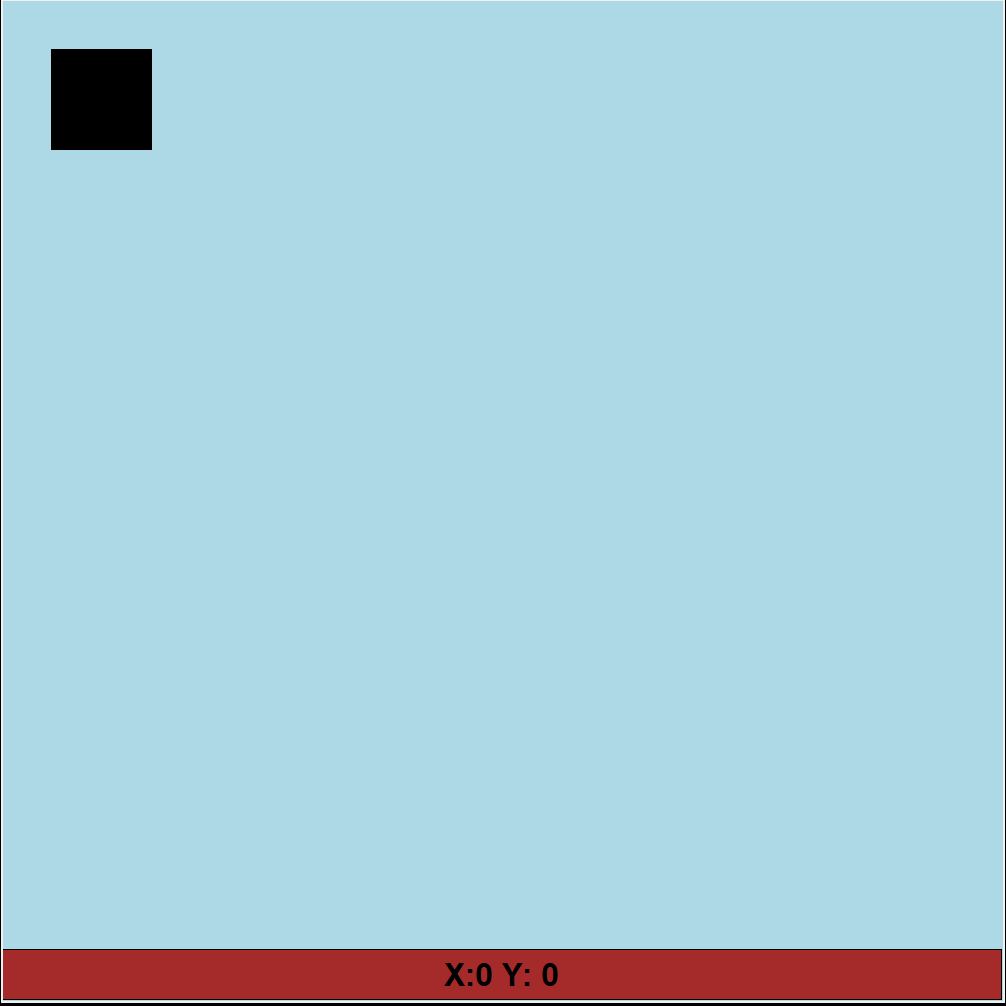In diesem Update habe ich einen Rand hinzugefügt welcher bis jetzt die gleiche Farbe hat wie der Hintergrund und somit nicht zu unterscheiden ist. Ebenfalls habe ich eine anzeige für die Position hinzugefügt mit genug Fläche für mehr anzeigen in der Zukunft.

import tkinter as tk
class MoveCharacter(tk.Canvas):
def __init__(self, parent, *args, **kwargs):
super().__init__(parent, *args, **kwargs)
self.dx = 0
self.dy = 0
self.text_field()
self.height = 150
self.width = 150
self.start_X = 50
self.start_Y = 50
self.x = self.start_X
self.y = self.start_Y
# Create the box (character)
self.box = self.create_rectangle(self.start_X, self.start_Y, self.height, self.width, fill="black")
# Set update interval in milliseconds
self.dt = 100
self.tick()
# Movement handler that gets called every dt milliseconds
def tick(self):
self.coordinats(self.dx, self.dy)
wall_check(self.center)
if not Dteck:
self.move(self.box, self.dx, self.dy)
if Dteck:
self.coordinats(self.dx, self.dy)
if not Dteck:
# Reset the movement after each tick
self.dx = 0
self.dy = 0
self.itemconfig(self.output, text=self.text)
# Repeatedly call tick method to continue the movement loop
self.after(self.dt, self.tick)
# Method to change direction of movement
def change_heading(self, dx, dy):
self.dx = dx
self.dy = dy
def coordinats(self, stepx, stepy):
self.x = self.x + stepx
self.y = self.y + stepy
self.center = [self.x , self.y ]
self.text = "X:" + str(self.x - 50) + " Y: " + str(self.y - 50)
def text_field(self):
self.create_rectangle(1000, 950, 0, 1000, fill="brown")
self.output = self.create_text(
500, 975, # x and y coordinates of the text
text="0, 0", # Text to display
font=("Arial", 24, "bold"), # Font style and size
fill="black" # Text color
)
def main():
global root,character_canvas
# Create the main window
root = tk.Tk()
root.title("2D Game")
root.geometry("1080x720")
root.configure(bg="black")
# Create the MoveCharacter canvas (size 900x900)
character_canvas = MoveCharacter(root, width=1000, height=1000, bg="lightblue")
character_canvas.pack()
keybindings()
# Start the main loop
root.mainloop()
def keybindings():
global ds
# Define movement step size
ds = 100 # Smaller step for smoother movement
# Bind key presses for movement
root.bind("<KeyPress-a>", lambda _: character_canvas.change_heading(-ds, 0)) # Move left
root.bind("<KeyPress-d>", lambda _: character_canvas.change_heading(ds, 0)) # Move right
root.bind("<KeyPress-w>", lambda _: character_canvas.change_heading(0, -ds)) # Move up
root.bind("<KeyPress-s>", lambda _: character_canvas.change_heading(0, ds)) # Move down
def wall_check(coords):
global Dteck
Dteck = False
if coords[0] < 50 :
character_canvas.change_heading(0, 0)
Dteck = True
character_canvas.coordinats(100,0)
if coords[0] > 900 :
character_canvas.change_heading(0, 0)
Dteck = True
character_canvas.coordinats(-100,0)
if coords[1] > 900 :
character_canvas.change_heading(0, 0)
Dteck = True
character_canvas.coordinats(0,-100)
if coords[1] < 50 :
character_canvas.change_heading(0, 0)
Dteck = True
character_canvas.coordinats(0,100)
print(coords)
# Run the program
main()
